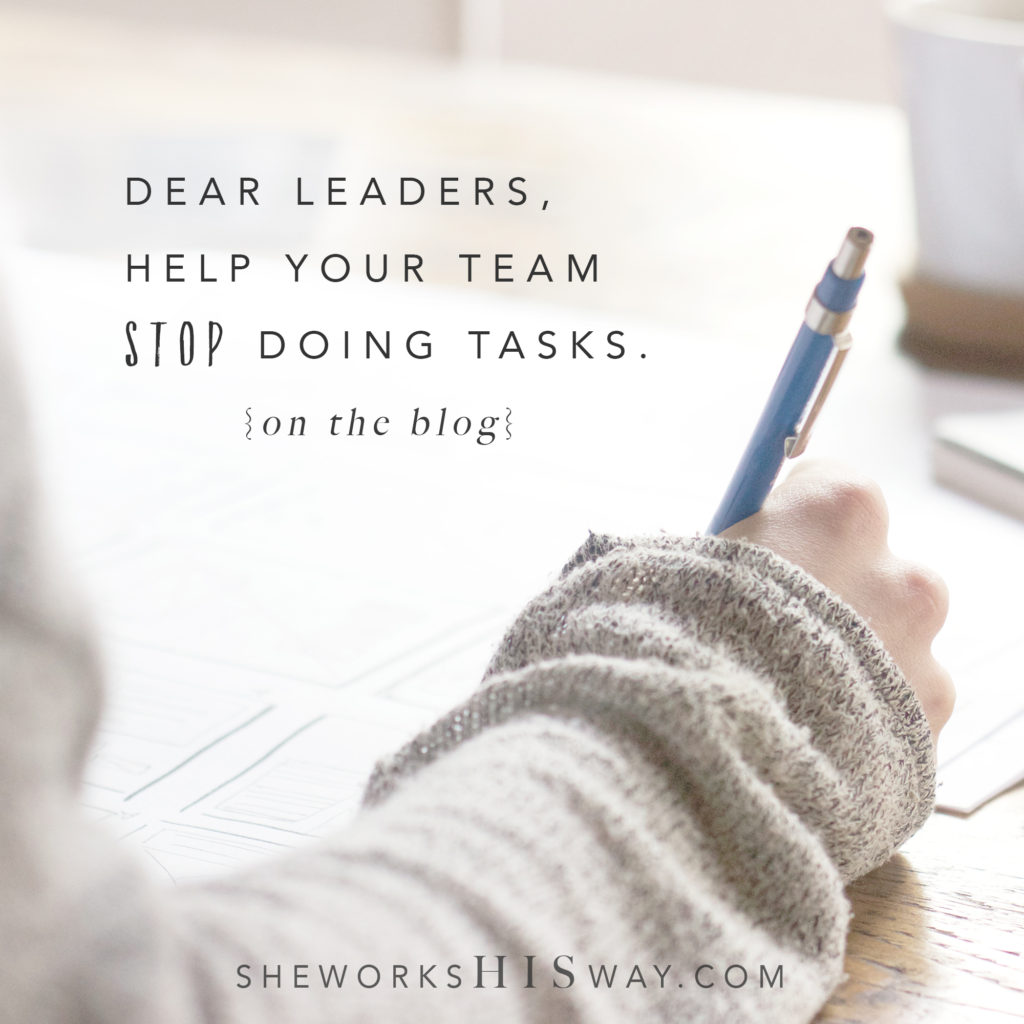“That’s it!” I exclaimed excitedly, during a brainstorming session. “We’ve got to stop doing tasks. From now on, every team member needs ownership areas.”
Don’t you love when you have an A-HA moment that you’ve been waiting on?
So our team has done this in the last few months. We’ve done away with tasks and implemented ownership areas.
Why? Because tasks are tedious. Tasks can just as easily get done as they can be forgotten. Tasks sound insignificant. And just from the sheer definition of the word, tasks sound like someone is getting bossed around.
On the other hand, ownership areas don’t get missed because responsibility is clear. Ownership areas simultaneously show your trust in your team and give them authority to make decisions they’re fully capable to make.
So I’m challenging you: Effective immediately, stop doing tasks and start assigning ownership areas. You will do yourself and your team a huge service with this simple change in verbiage.
How it helps your team:
Competence + Authority
For lack of a better word, if you’re the “boss,” there will be plenty of tasks your team feels they need to run by you if you’re the “owner” of every area.
In a recent podcast I listened to with Andy Stanley, I loved that he distinguished between authority and competence. As the boss, just because you have the authority to make all decisions, that doesn’t mean you’re the most competent person on the team to make the decision. (And if you’ve hired right, each person on your team should be better than you in some area…if not multiple areas!)
Ideally, you assign each ownership area to the most competent person on the team in that area. So now, you’ve not just given the most competent person a task, you’ve given the most competent person the authority to own that task in the future.
Responsibility + Accountability
Having an ownership area immediately creates a sense of responsibility that merely doing a task cannot. If someone knows no one is going behind them to “check their work,” great teammates will rise to the challenge and truly give it their best. Not-so-great teammates will probably crumble and look to move on (which isn’t always a bad thing!) When every teammate thrives on responsibility and accountability, team synergy goes through the roof.
It also allows the appropriate contributions to both be recognized and evaluated. When an ownership area succeeds, the owner of that area gets to celebrate a big win. I’ll be honest; this might be my favorite part. I love that our whole team immediately knows who to thank and high five when we have a victory! Plus, winning as a team is much better than celebrating alone. (Bonus: This also increases team loyalty. People aren’t as likely to leave when they feel like they’re winning!)
The opposite is also true. When an ownership area struggles, the owner gets to accept the blame, correct the mistake, and prepare better for the next time. This isn’t a time to have a teammate walk around with their tail between their legs; but quite honestly, there’s usually great opportunity for growth through making a mistake. When your team has to go through this process of ownership, correction, and future preparation, they will inevitably grow in their skill and in their leadership.
How it helps you as a leader who develops ownership areas instead of tasks:
Repeat yourself less.
When you assign an ownership area, no one wonders who does that task the next time it comes up. Once an ownership area has been delegated, every time that assignment occurs, the owner of that area knows it belongs to them instead of wondering if they’ll be doing it again. Even when new tasks pop up, if ownership areas have been clearly defined, the appropriate people will typically step up without you having to ask.
As a leader, few things make me feel more loved by my team than when they own a responsibility to keep as much off my plate as they can. This communicates not only their care for me, but also how importantly they believe in our mission.
Lead more effectively.
Ownership areas repeatedly help you identify your teammates who are winning and your teammates who are struggling. Winning teammates need to be celebrated. It might be appropriate for special incentives or recognition. Depending on the size of your organization, you might not know every moving piece of your team. But when a win happens, you should know who to thank and celebrate. Ownership areas allow you to easily reward your team.
The opposite is also true. If no one takes final ownership but you, it’s hard to identify where systems are breaking down or which link in the chain needs to be mended. But let me be clear: just because a teammate is struggling, that doesn’t mean they’re a bad teammate. Maybe they’ve been assigned the wrong ownership area. Maybe they haven’t been properly trained. Or maybe there’s a personal issue that needs to be addressed. Either way, problems don’t get fixed unless they’re addressed. Ownership areas don’t make problems easier, but they do make them simpler to track down.
Get to spend more time doing what adds the most value to the organization.
When leaders are bogged down with details that they either aren’t as competent in or could be easily decided by someone else, they step outside of their personal areas of greatest contribution to the team. Having ownership areas where the team shares the responsibility allows the leader to actually have time to lead (which does require time!) and do what they do best.
This shift has made such a positive impact for our team. Full disclosure: it will require some time up front to train and assign, but after a few weeks of settling into the new normal, everyone on the team will feel more valued, have clearer expectations, and work more effectively.
If you’d like to move away from tasks and toward ownership areas, here are a few questions to send your team for evaluation:
- What areas/tasks do you do that you feel adds maximum value to the team?
- What current tasks are you currently doing that limit your effectiveness in what you do best?
- What systems help you function at the highest capacity in your role?
- What systems need to be created for you to be more effective?
- What’s something I currently do that is helpful for you?
- What’s something I could do to lead you better?
Michelle Myers is the founder of she works His way. An entrepreneur at heart, she also helps runs two other businesses with full teams. If you’d like information about scheduling a consulting call to see how Michelle could help your business/team thrive, fill out this form.

